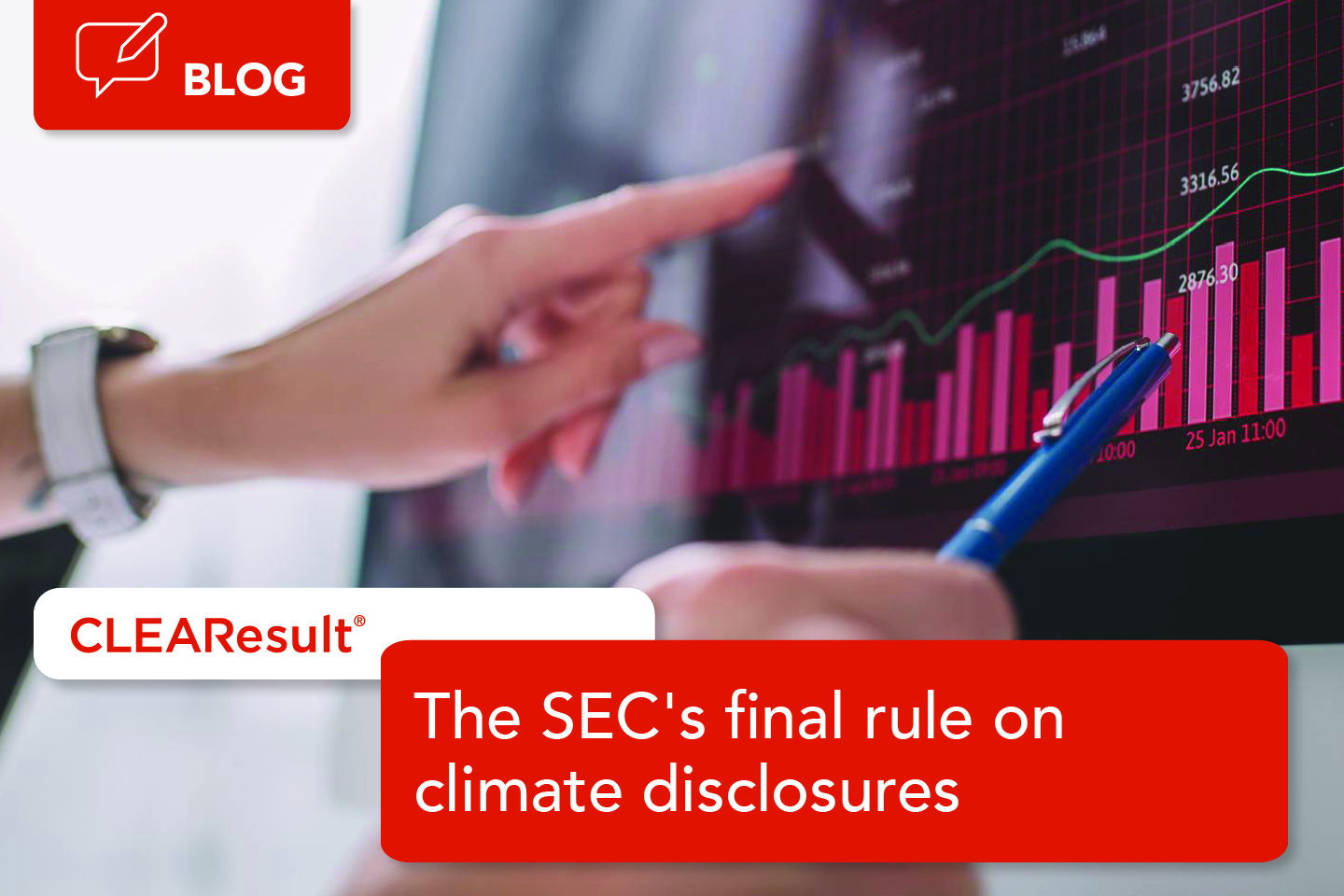What companies need to know about the SEC’s final rule on climate disclosures

In 2022, the U.S. Securities and Exchange Commission (SEC) proposed comprehensive rules mandating that public investor-owned companies report their greenhouse gas (GHG) emissions and climate risks. That means these businesses need to set up systems to track and report Scope 1, 2, and 3 emissions. Scope 3 emissions are especially challenging to track as it entails measuring emissions caused by vendors within a company’s supply chain. The SEC received an unprecedented 24,000 public comments from companies mostly concerned about how these rules might affect their operations, profitability and corporate reputations.
On March 6 of this year, the SEC released an 886-page final rule document detailing the climate-related disclosure requirements for publicly traded companies. This final rule document is substantially less strict than the original proposal and was shaped by public feedback.
We put together the highlights from this document below.
Overview of requirements by company size
- All companies registered with the SEC will be required to report climate risks that they deem "material" to investors—as well as transition plans, goals, and progress in mitigating these risks—during a phase-in period starting in 2025 for large companies and extending through 2027 for smaller firms.
- Large, accelerated filers (companies with $700 million or more in public shares) must annually report the previous year's "material" Scope 1 and 2 greenhouse gas (GHG) emissions starting in 2027. This includes GHG emissions generated onsite at corporate facilities and those resulting from energy purchases from providers such as utilities.
- Accelerated filers (companies with publicly owned shares between $75 and $700 million) will be required to report their GHG emissions beginning in 2029.
- Emerging growth companies and smaller reporting companies that fall below the $75 million threshold are exempt from reporting their GHG emissions.
Key highlights of the final rule
- Extended deadlines: Large, accelerated filers have additional time to start reporting climate risks (an extra 2 years) and carbon accounting data (an additional 3 years).
- Materiality defined: Companies need only report climate risks and emissions information that a "reasonable investor" would deem important for making investment or voting decisions. This offers greater discretion than the initial proposal.
- Scope 3 emissions disclosures optional: Disclosure of GHG emissions from a company’s upstream and downstream activities and partnerships is not mandatory. These often constitute the bulk of a company’s GHG emissions.
- Climate risks impact: Firms must disclose the actual or potential impact of climate risks on their strategy, business model, and outlook, as well as resource allocation to mitigate these risks.
- Fewer details required: The rule removes the necessity to itemize various costs, expenditures, losses, and specific financial statement metrics, permitting companies to report aggregated figures.
- Flexible reporting: Companies should provide a brief explanation of their emissions calculation methods without being bound to a specific standard or protocol.
- Governance overview: There is a requirement to outline the board of directors' involvement in overseeing climate-related risk assessments and reporting, but no mandate to report any director’s specific experience or expertise in this area.
- Renewable energy credits and offsets disclosure: Financial statements should indicate if renewable energy credits and carbon offsets are integral to the company’s climate strategy.
Looking ahead
Several states, industry groups and individual companies have already filed lawsuits alleging that the SEC has exceeded its legal authority by enforcing its final rule requirements on businesses. Environmental groups have also initiated lawsuits, arguing that the final rule omits more comprehensive emissions reporting requirements included in the initial proposal. On March 14, 2024, a federal appellate court issued a temporary stay order, pending judicial review of the final rule.
Despite the decisiveness implied by the SEC’s final rule, we expect its reporting requirements to evolve. It is also likely other benchmarks like the GHG Protocol and California’s new climate laws will change over time as stakeholders work toward a consistent global standard for required disclosures.
As we prepare for the final rule's implementation, we advise reviewing the final rule document and consulting with decarbonization experts before filing.